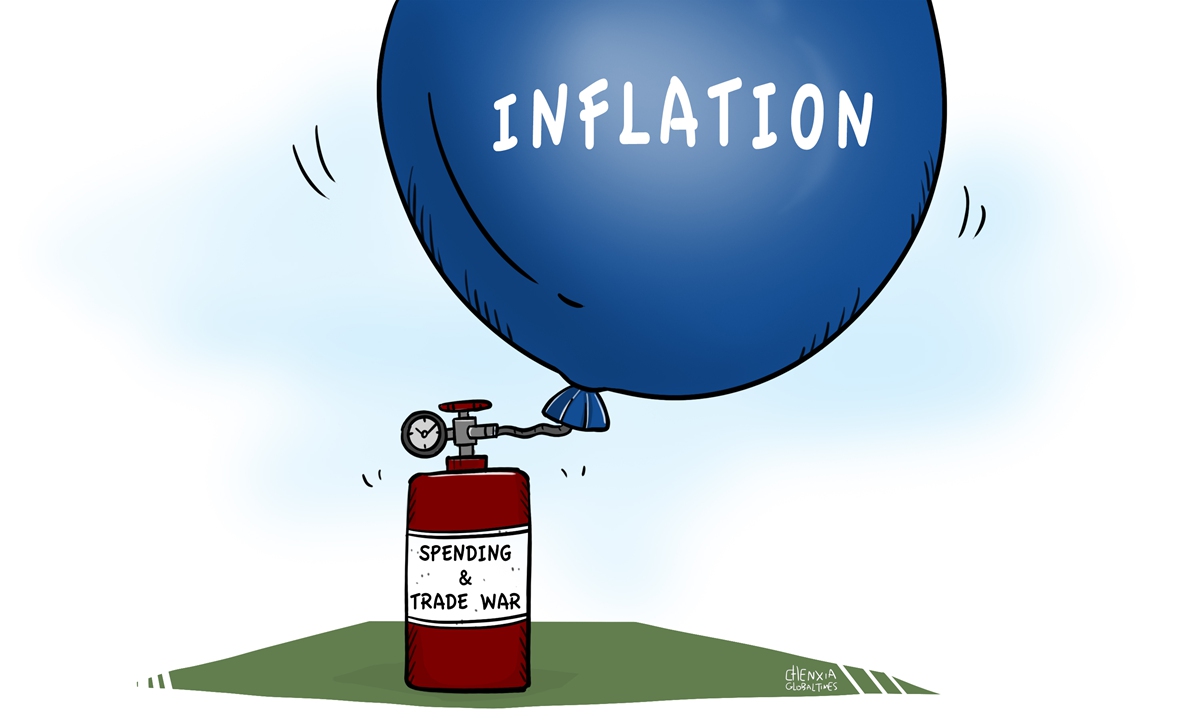Opinion: US' trade war with China is a lost cause; Biden has no choice but to end it

Illustration: Chen Xia/Global Times
On August 31, 2021, a day after he oversaw a chaotic and deadly military withdrawal and ended the two-decade war in Afghanistan in utter humiliation, US President Joe Biden forcefully defended his decision. Biden argued that his predecessor, Donald Trump, had signed an agreement with the Taliban to withdraw US troops before May 1 and he was only left with two options: leaving Afghanistan as agreed upon or going back to war.
“That was the choice, the real choice. Between leaving or escalating. I was not going to extend this forever war. And I was not extending a forever exit,” Biden said, while asserting that the withdrawal was an “extraordinary success.” As the entire world witnessed, the US' evacuation was anything but a success.
Unfortunately, for Biden, after roughly eight months, he is facing another tough decision in another American war. Biden is now under serious pressure to take action on whether he should end the tariff war waged by his predecessor on China or continue the war whose costs on American businesses and consumers are mounting rapidly. While addressing his nation, Biden said that the White House was considering removing some of the punitive tariffs imposed by Trump against Chinese imports to help tame runaway inflation in the country.
First and foremost, regardless of the decision Biden will make, the US' tariff war against China is another lost cause for Washington, which, in certain ways, is on par with its previous lost causes in Vietnam, Afghanistan and more. To put it bluntly, the tariff war failed miserably in achieving any of the goals laid out explicitly by the Trump administration and Washington's politicians dream to this date: reverse the US' massive trade deficit with China and to contain China's rapid rise.
China's economy not only shrugged off the impact of the trade war, which once cast a dark cloud over the world's second-largest economy, but also the fallout of the pandemic as it became the first major economy to recover from COVID-19 and continues to see relatively faster growth despite lingering challenges.
Not only that, the duties have cost US businesses and consumers trillions of dollars and hundreds of thousands of jobs over the past three years.
Numbers do not lie. As China's Ambassador to the US, Qin Gang, recently noted, the exports from the US to China in 2018, 2019 and 2020, the first three years of the trade war were lower than in 2017. Since the beginning, the tariffs have cost US corporations more than $1.7 trillion and increased American household spending by $1,300 each year. During the same period, the tariffs also caused the loss of over 240,000 jobs in the US.
These numbers might not concern the Biden administration during normal times. After all, the world's biggest economy has the capacity and resilience to cope with such losses. However, these are times far from normal. Due to a confluence of factors, from the COVID-19 pandemic and its haphazard response and economic policymaking, to the Russia-Ukraine conflict and related US-led sanctions on Russia, the US is facing dangerous levels of inflation which have already hurt American voters. That is precisely why Biden started to talk about the removal of the tariffs.
The rationale behind the policy shift is very straightforward. Economists and business leaders from both China and the US have repeatedly argued that lifting the tariffs would help US companies and consumers significantly in coping with the decades-high inflation. Many have rightfully pointed out that the tariffs, although imposed on Chinese products, were actually extra taxes on US businesses and consumers. It is hard to believe the Biden administration does not know this simple logic. So, a better explanation is that the administration is on a tariff struggle because it does not want to lose the war under its watch just like many US administrations did during the Vietnam war, despite knowing it was a lost cause, to avoid humiliation.
Certainly, under the current toxic political environment in Washington filled with raging anti-China hostility, ending the tariff war means Biden will be crucified by his political opponents, particularly Trump and his former lieutenants who are looking to run for president in 2024. However, doing nothing about the runaway inflation that hurts American voters would also hit Biden and his Democrats in the upcoming midterm elections and the presidential election in 2024. The biggest difference between the two options is that lifting the tariffs would actually benefit American voters directly. So, Biden really has no better option other than to end the tariff war and deal with the political blowback head on. At least that way, he would actually be fighting for Americans as he claims to be.
The author is an editor with the Global Times. bizopinion@globaltimes.com.cn

